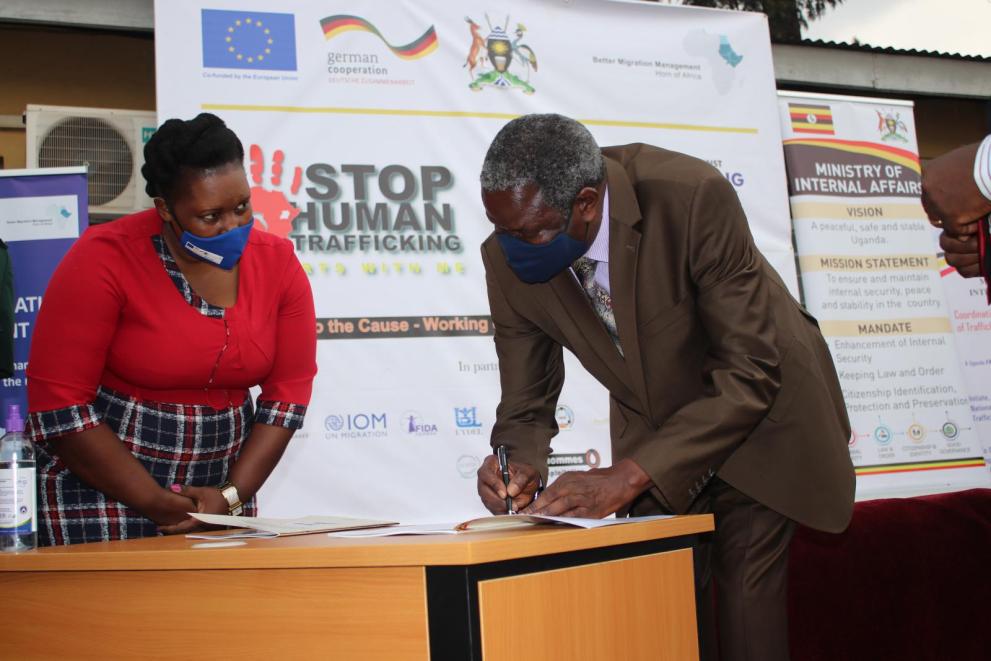
Human trafficking is an estimated 150 billion US-Dollar industry and one of the fastest-growing transnational criminal activities of the 21st century according to the International Labour Organization. Large trafficking rings operate nationally, regionally and globally in this business. This is also the case in Uganda which is a country of origin, transit, and destination of trafficked men, women, and children subjected to various forms of exploitation, including forced labour, child sacrifice, street begging, child marriage, and sex trafficking. The Better Migration Management programme, funded by the EU and BMZ, supports the Ugandan government in tackling human trafficking.
On the World Day against Trafficking in Persons (30 July), the Ministry of Internal Affairs has launched the second Uganda National Action Plan for Prevention of Trafficking in Persons, and the National Referral Guidelines for Management of Victims of Trafficking. This marks another step of the Ugandan Government to counter human trafficking. In 2009, Uganda already passed the Prevention of Trafficking in Persons Act, which mandates Government to produce a five-year National Action Plan on Trafficking in Persons. Uganda’s first National Action Plan on Prevention of Trafficking in Persons, which expired in December 2018, was based on five strategic objectives, including: enhancing national policies and legal frameworks, increasing successful prosecutions, reducing vulnerability to human trafficking, improving victim protection and assistance mechanisms, as well as developing well-coordinated systems and structures to manage the crime. This second plan builds on lessons learnt from implementing the first one and urges the establishment of structures and systems to prevent the crime in a sustainable way, of curricula and trainings to systematically identify, protect, and support victims, of improved effective investigations and prosecution, and of cooperation between the different actors at both the national and transnational levels.
According to the Uganda Association of External Recruitment Agencies 140,000 Ugandans are working in the Middle East. They are often recruited by false promises of decent work. Traffickers often confiscate their passports and money, some make threats against victims or their families to avoid them trying to escape. But also Ugandan children and women are trafficked for forced labor and commercial sexual exploitation within or outside the country. On the other hand, children from other African countries and from India are trafficked to Uganda for agricultural labor and commercial sexual exploitation. Pakistani, Indian, and Chinese workers are reportedly trafficked to Uganda.
Background:
The Better Migration Management (BMM) programme – currently in its second phase – is a regional programme funded by the EU Trust Fund for Africa and the BMZ, and aims at improving the management of migration flows within the Horn of Africa. It notably supports Uganda implement national policies and legislation to counter human trafficking. The project advises on the ratification of the United Nations Convention against Transnational Organized Crime (UNTOC) protocols against smuggling of migrants and Trafficking in Persons. BMM also develops and implements curricula and training to improve investigation and prosecution of human trafficking cases. It promotes regional cooperation and the establishment of regional policies. Furthermore, BMM support the government and civil society organisations such as the Ugandan Coalition Against Trafficking In Persons to prevent human trafficking and to protect victims of trafficking. The Ugandan National Action Plan for Prevention of Trafficking in Persons, and the National Referral Guidelines for Management of Victims of Trafficking were supported by the International Ogranization for Migration as one implementation partner of BMM.
Details
- Publication date
- 30 July 2020
- Region and Country
- Uganda
- Thematic
- Improved migration management
- Partner
- GIZ
